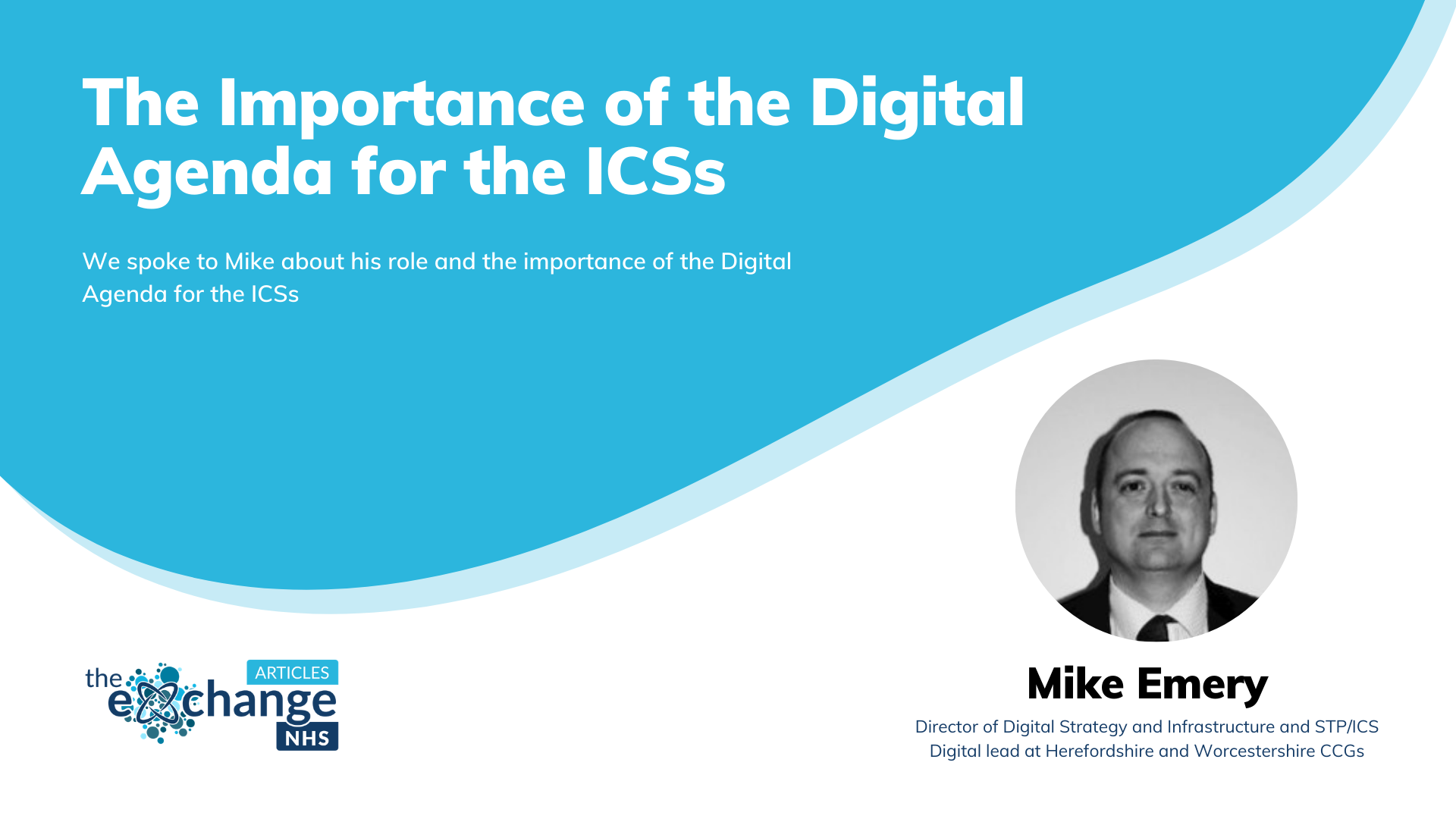
Mike Emery is the Director of Digital Health and Infrastructure for Herefordshire and Worcestershire CCG, as well as the Chief Information Officer for the Integrated Care System (ICS) for Herefordshire and Worcestershire. This complex role involves leading the primary care digital services for the two counties and leading on the development of the digital strategy and programmes for the ICS.
Mike came to this role with a wealth of experience, from working in service transformation across the public sector, to being a management consultant for KPMG, where he advised organisations on transformational strategies, organisational development and design. The common pillars of information, analytics and performance management have been clear throughout his career, and these skills have been particularly useful in his current placement.
Integrated Care Systems (ICSs), are partnerships that bring together all of the NHS partners in a particular geographical area, and aim to be true collective with a duty to deliver improved health outcomes and reduce health inequalities. By ensuring that acute trusts, primary care, community trusts and local authorities work together collaboratively, ICSs improve the service offered for all patients.
This collaborative working is designed to improve results for all organisations within the NHS.
“It brings all those partners together to work in collaboration rather than working in competition. We focus on the individual and the care that’s wrapped around them, rather than just the different care settings , so it brings with it a different culture and ethos, which I think is very much welcomed by all in the NHS.”
The scale of the population covered by Herefordshire and Worcestershire ICS – over 800,000 people – and the different care requirements that they all have, means that digital ventures must be used effectively to help the ICS operate as it should.
For Mike, there are four key things that the digital agenda should cover. Firstly, improving how information is shared across different care settings, so that medical professionals can immediately access the information they require. Secondly, using the information collected to improve the services, such as targeted interventions across the community. Thirdly, improving the technical infrastructure to provide better care out-of-hospital, including remote monitoring. Finally, developing the technical infrastructure across the ICS so that all settings reach the same level of digital maturity.
Alongside this runs the importance of ensuring that upscaling digitally doesn’t cut off vulnerable patients.
“The theme that cuts through all of this is digital inclusion and health inequalities. There is a risk that we can use digital to respond to it and help reduce inequalities. But if we’re not careful, we can increase those inequalities by not looking at those left behind.”
With some areas having low connectivity, it is important to use innovative technologies and work with things such as 5G to ensure that no one is left behind.
“Worcester has been very keen to be part of the Department for Digital, Media, Culture & Sport testbed pilot. Working with local authority colleagues and focusing on health, we want to demonstrate that improving connectivity in rural areas will actually solve many of those health inequalities issues and enable access to particular digital services.”
In order to ensure the success of a large organisation,such as an ICS and drive forward the digital agenda, excellent leadership skills are paramount. A part of this is the political ability to bring people together, as well as balancing the long-term strategic goals against opportunistic ways of working – as has been required during the pandemic.
“We talk a lot about playing a key role in convening and facilitating programmes, bringing people together, and trying to get them all to understand what the common outcome we’re all trying to work towards is. When you start at that point, everybody’s in the same place, we’re all about delivering improved services and value for money for our population.”
In order for this to be successful, constant communication is a necessity. A clear vision or roadmap of where the team are heading is vital, but with direction changing sometimes within 24 hours, flexibility, openness and honesty are required.
During a time when NHS staff have had to work exceptionally hard supporting the population through the pandemic, highlighting successes and emphasising the incredible work that has been done has been extremely important.
“We’ve been particularly successful in our vaccination programme, seeing very high uptake rates, so we’ve been talking to all our staff and saying, well, from a digital perspective, we put all that IT into all the centres and we put the clinical systems in. Constantly reminding our workforce, what they’ve delivered, and what a huge difference they’ve made in a challenging time.”
One of the main challenges for the continued development of the digital agenda across the ICS, is the question of what the digital workforce should look like. Although the traditional route – with graduates in the digital sphere entering the NHS – is important, Mike is keen to ensure that more people from the nursing or quality worlds join the team. This also raises questions about how to identify and upskill those people.
“We need people from different backgrounds, because digital is really one of those areas where a range of backgrounds and viewpoints gives you a better product.”
It is also impossible to ignore technology and infrastructure challenges that exist, such as the different levels of IT maturity between different organisations, and making sure that suppliers develop open source to allow information to be exchanged.
Finally, for Mike, the focus must be on making sure that the digital agenda is constantly part of discussions, so that it can reach its full potential.
“It’s about ensuring that the digital agenda is very much part of the ongoing conversation and development of vision for ICSs. So that means making sure that we have a voice in the right decision-making forums.”